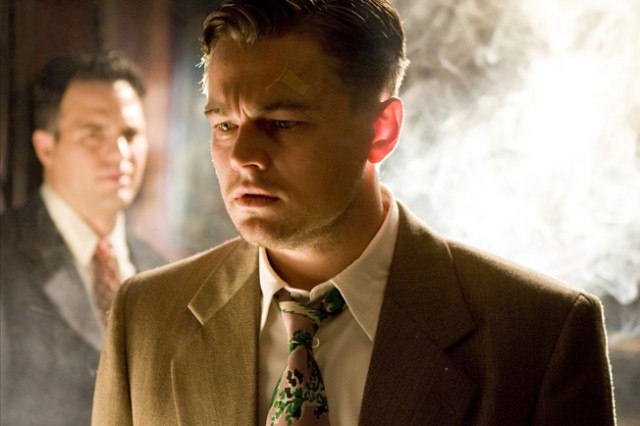
The film version of Dennis Lehane’s creepy psychological thriller Shutter Island has taken a while to get on the big screen, but it was worth the wait. With Leonardo DiCaprio in the starring role as U.S. Marshal Teddy Daniels, a leisurely pace, moody ensemble and sinister exteriors, it’s one of the best psychological thrillers in quite a while.
Set during a stormy weekend in 1954, Shutter Island is the home of Ashcliff, a mental hospital for the criminally insane — “people too dangerous for anywhere else,” as Dr. Cawley (Ben Kingsley) explains during the opening. Teddy, and his partner Chuck Aule (Mark Ruffalo) have been sent to help track down Rachel (Patricia Clarkson), an inmate who has gone missing.
Teddy is only a few years out of the Army, where he was traumatized by his part in the liberation of the German concentration camp Dachau at the end of World War II. His flashbacks are shocking and create great sympathy, even as we wonder, who’s really crazy in this place?
Shutter Island isn’t a fast-paced horror film. In fact, I can’t recall a single startling scene. The feel of this extraordinarily well-assembled movie is more of a slowmotion train wreck, a story that unfolds in creepy, sinister and disturbing ways, as you realize not everything is as it seems, nor is everyone who you think they are.
The residents of Ward C are the most dangerous at Ashcliff and include Andrew Laeddis (Elias Koteas), who set the apartment fire that killed Teddy’s wife Dolores (Michelle Williams). Aule is convinced that it’s revenge that’s brought Teddy to Shutter Island in the first place: to track down and kill Laeddis in retaliation for the death of his wife. For her part, Dolores keeps appearing in Teddy’s troubled dreams.
The dream sequences are hallucinatory and visually stunning. In one it’s raining ashes, and while Teddy hugs her tight, Dolores turns to dust and crumbles away. In another, he revisits Dachau but finds that it’s an even more surreal world. In a film about sanity and insanity, you’ll do well to pay close attention to what happens in these dreams.
Shutter Island is a difficult story to tell on screen because the weirder it gets, the more internal inconsistencies appear and the more you risk the danger of toying with the viewer. What if the scene you just saw wasn’t real? And the one before it? After a while, it just ends up being confusing. Did Teddy really experience the liberation of Dachau?
I’m a big fan of Kingsley, but in addition to his great, menacing performance, I have to compliment the entire cast. It’s distressingly rare that a film comes out where every performance is great, but from DiCaprio and Ruffalo on down the list, everyone really digs into their part and brings it to life, innocent or sinister.
My disappointment with Shutter Island was that the ending didn’t tap into the inherent ambiguity of a story about truth and fantasy, about reality and hallucinations, about paranoid delusions and secrets too horrible to share.
The ending is a big disappointment. In fact, I really want to believe that Martin Scorsese knows this and that there’s going to be a “director’s cut” when the film comes out on DVD that will tie everything together quite well (it’d only take about 60 seconds of new footage to do so). But for now, you might be pretty unhappy about a two-hour film that ends in this manner. You’ve been warned.














